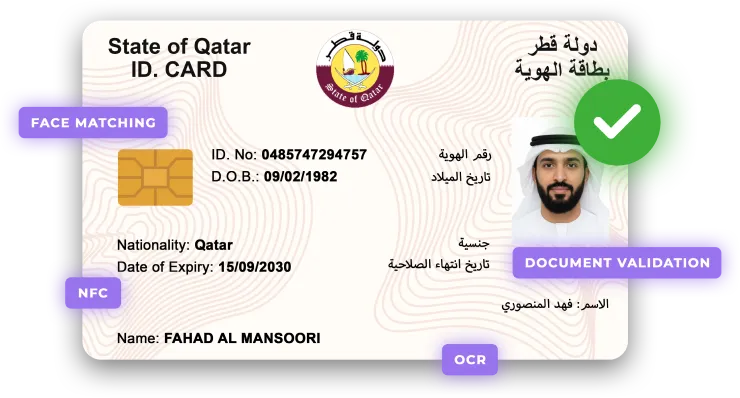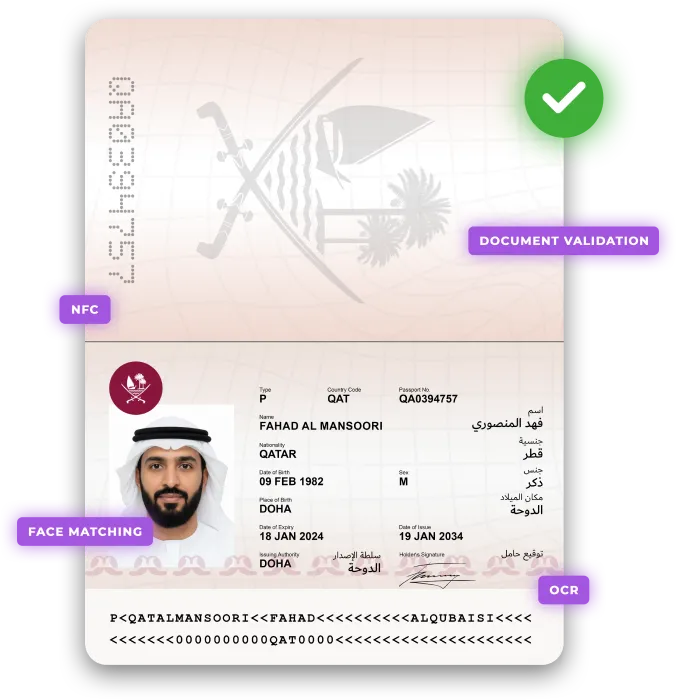COVERAGE
Your Qatar-Ready Compliance Solution
Built for Qatar’s regulatory landscape, our compliance tools support local laws and languages to ensure secure, uninterrupted business operations.

Trusted by 1,700+ clients globally









Who are the regulators in Qatar?
NAMLC Qatar
An autonomous unit within Nigeria’s Central Bank receiving and analysing STRs/CTRs, and disseminating financial intelligence to law-enforcement, regulatory, and supervisory agencies.
Qatar Financial Information Unit (QFIU)
Qatar Financial Information Unit receives and analyzes suspicious transaction reports from FIs and DNFBPs, producing intelligence for authorities including Public Prosecution, State Security, and regulators.
Qatar Financial Centre Regulatory Authority (QFCRA)
Qatar Financial Centre Regulatory Authority (QFCRA) independently authorizes and supervises QFC firms, ensuring compliance with AML/CFT obligations under state legislation and AML/CFT Rules 2019.
Qatar Central Bank (QCB)
The Qatar Central Bank regulates financial institutions, ensuring through inspections that supervised FIs comply with AML/CFT obligations by following QCB instructions and guidelines.
Ministry of Commerce and Industry (MOCI)
The Ministry of Commerce and Industry monitors AML in the DNFBP sector, supervises accountants, auditors, dealers in precious metals and stones, and trust and company service providers, and issues rules for DNFBPs.
Who is regulated in Qatar?
Financial Institutions (FIs)
Who are classified as FIs?
Banks
Credit Institutions
Insurers
Money Service Businesses
Investment Firms
Exchange Houses
Designated Non-financial Businesses and Professions (DNFBPs)
Who are classified as DNFBPs?
Real Estate Agents
Dealers in precious metals and precious stones (DPMS)
Lawyers
Auditors
Trust & Company Service Providers (TCSPs)
Expectations for regulated firms
Firms must apply a risk‑based approach, perform Customer Due Diligence (CDD) including identification of beneficial owners, monitor transactions continuously, and file Suspicious Transaction Reports (STRs) to the QFIU.
Entities must also appoint compliance officers, maintain internal AML/CFT controls and policies, and train staff in line with international standards, such as those of the Financial Action Task Force (FATF).

AML/KYC Checklist for Qatar
- Verify identity of clients (natural or legal persons) and identify/verify beneficial owners.
- Assess risk profile (PEPs, sanctions, geography, product/channel) and apply Enhanced Due Diligence (EDD) for higher‑risk customers.
- Screen for sanctions/terrorist lists, maintain records of CDD and source of funds where required.
- Ensure timely submission of STRs to the QFIU via authorised channels.
Supervision & Enforcement
QFIU receives and analyses STRs, disseminates intelligence to law enforcement and supervisors.
Supervisory authorities have the power to impose administrative penalties, suspend or revoke licences, and levy daily fines up to QAR 100 million for severe violations.
Cooperation between regulators is formalised (e.g., via MoU between QFMA and QFC) to improve coordination and oversight.

Supported ID documents from Qatar
National ID
Idenfo can verify the Qatari ID, the national identity card issued by the Ministry of Interior, ensuring precise data matching and full compliance with Qatari regulatory requirements.
Document Verification
- Evaluates document quality by checking for glare or blur.
- Identifies any signs of tampering or forgery within the document.
- Confirms the authenticity of hologram prints.
- Extracts key data using optical character recognition (OCR).
NFC Scanning
- Reads data from the identity card's NFC chip.
- Verifies the NFC chip data for integrity and authenticity.


Qatari Passport
Idenfo verifies Qatari passports issued by the Qatar Immigration Department, confirming the holder’s name, date of birth, and contact details as part of Enhanced Due Diligence for KYC in Qatar.
Document Verification
- Evaluates document quality by detecting glare or blur.
- Identifies potential tampering or forgery.
- Verifies the document’s format for accuracy.
- Cross-checks data against the MRZ code and hologram.
NFC Scanning
- Reads data from the passport's NFC chip.
- Verifies the NFC chip data for integrity and authenticity.
How it works

Document Capture
Scan and extract key identity details from official documents.

Liveness Check
Ensure the person is real and matches their verified ID photo.

Data Verification
Cross-check personal details against trusted government sources.

Risk Screening
Assess AML and sanctions risks before onboarding customers.

User Authentication
Simplify returning logins with secure biometric authentication.

